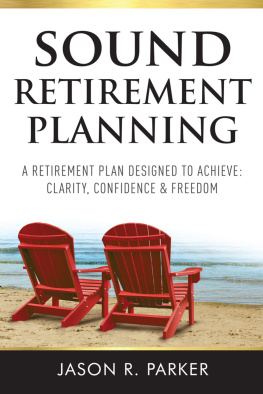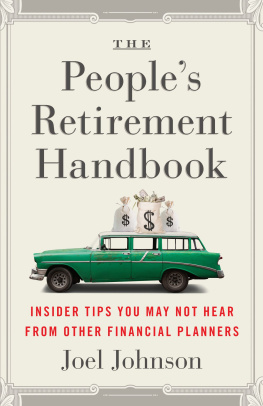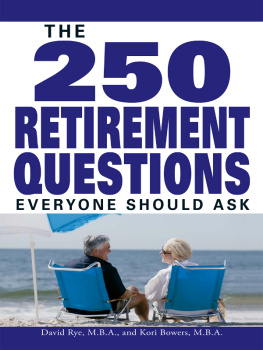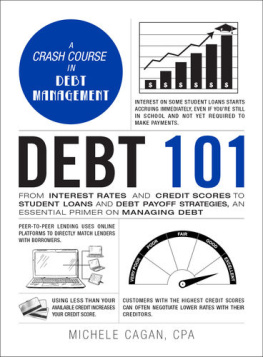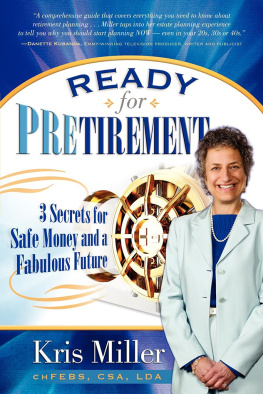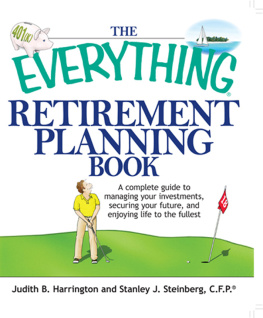Contents
Guide
Social Security 101
From Medicare to Spousal Benefits, an Essential Primer on Government Retirement Aid
Alfred Mill

Avon, Massachusetts
Copyright 2016 Simon and Schuster
All rights reserved.
This book, or parts thereof, may not be reproduced in any form without permission from the publisher; exceptions are made for brief excerpts used in published reviews.
Published by
Adams Media, an imprint of Simon & Schuster, Inc.
57 Littlefield Street, Avon, MA 02322. U.S.A.
www.adamsmedia.com
Contains material adapted from The Everything Retirement Planning Book by Judith B. Harrington and Stanley J. Steinberg, CFP, copyright 2007 Simon and Schuster, ISBN 10: 1-59869-207-0, ISBN 13: 978-1-59869-207-5 and The Everything Personal Finance in Your 20s & 30s Book, 3rd Edition, by Howard Davidoff, JD, CPA, LLM, copyright 2012 Simon and Schuster, ISBN 10: 1-4405-4256-2, ISBN 13: 978-1-4405-4256-5.
ISBN 10: 1-4405-9922-X
ISBN 13: 978-1-4405-9922-4
eISBN 10: 1-4405-9923-8
eISBN 13: 978-1-4405-9923-1
Printed in the United States of America.
10987654321
Cover design by Heather McKiel.
Cover images Clipart.com.
Interior images iStockphoto.com/zimmytws/larryhw/Laura Young/MariuszBlach; Global Cuts; 123rf.com/Robert Mizerek/zimmytws/Brian Jackson/racorn/iqoncent/dmbaker.
This book is available at quantity discounts for bulk purchases.
For information, please call 1-800-289-0963.
Introduction
When you think about your retirement, whether its coming up soon or many years away, youll start to think about Social Security. Since the Social Security program is going to be an essential part of your golden years, and since youve probably heard people say that its running out of money, youll probably have a lot of questions:
How much money will I get?
How does the government calculate that figure?
Will my Social Security benefits be taxed? If so, how much?
Is the program going broke? Will there even be any money by the time I retire?
A whopping 74 percent of single people and 52 percent of married couples are going to depend on Social Security payments for more than half their income in retirement. But for something so financially important, many people know very little about Social Security.
Social Security 101 will give you the most up-to-date information about this government program. Youll learn how to apply for benefits and when you should start taking them. Youll also learn strategies to maximize the benefits you receive and about recent changes to Social Security laws, changes that affect your filing plans.
Like any part of the government, the Social Security Administration can seem intimidating. Social Security 101 will explain to you how this agency works and how you can appeal its decision about your benefits if you dont agree with it. Youll also learn about the government healthcare programs Medicare and Medicaid and how they relate to your Social Security benefits.
Social Security is an important component of a carefully thought-out retirement plan. It is in your best interest to learn as much as you can about how Social Security works so that you can be sure to receive all the money thats coming to you. This book will be an essential part of the toolkit you can use to build a financially secure retirement.
What Is Social Security?
A Retirement Plan for Everyone
On the first day of your first full-time job, retirement was probably the last thing on your mind. You were too busy wondering how to learn all your duties, impress your boss, and find out where the bathrooms and the coffee machine were located. You were thinking about this amazing new world of work youd just stepped into and what kind of people you were going to meet and work with. All in all, it was probably one of the most exciting days of your life. Retirementif it even crossed your mindwas something far off in the misty future. Chances are, the subject of Social Security was something that didnt even remotely intrude into your consciousness.
Although you may not have been thinking about Social Security, the Social Security Administration (SSA) was already thinking about you.
With your first paycheck, you took a step into the complex government program called Social Security. For the rest of your working career, that program tracks you. And when you finally decide to retire at the age of sixty-two or older, youll apply to the SSA for the benefits youve accumulated in the course of your working life.
As you begin to approach your full retirement age (more about that later), youll probably give more and more thought to Social Security:
- How much are my benefits per month going to amount to?
- What if its not enough for me to live on?
- I keep hearing that Social Security is going bankrupt. What if all the moneys gone by the time I retire?
- Where can I go for help in figuring this stuff out?
These are all good questions, and there are certainly plenty of others. Social Security has been around for a long time, and its seen its fair share of changes and adjustments. This has led to a seemingly byzantine set of rules and regulations. Well explain the most important of these as we go on, but for right now the important thing is for you to understand clearly what Social Security is.
Social Insurance
At its most basic, Social Security is a form of social insurance, set up and administered by the U.S. government. Payments to you from the system can begin as early as age sixty-two (although there are good reasons not to take your benefits that early, as well see) and will continue until you die. Its essentially a government-run retirement program that aims to keep you and your fellow retirees out of poverty.
The program is funded through taxes, which are collected directly from workers paychecks. Look on your latest paycheck stub and find the acronym FICA. The amount next to it is how much money from your paycheck went toward Social Security.
FICA and SECA
FICA stands for Federal Insurance Contributions Act. The Social Security tax is also sometimes designated SECA, which stands for Self-Employment Contributions Act. This latter tax is levied on people who are self-employed (as the name implies). Some portion of both taxes also goes toward the governmental medical program, Medicare.
Payouts from the Social Security program are huge; according to the Social Security Administration, in 2015 about 59 million people in the United States received Social Security benefits. Total payouts through the program amounted to almost $870 billion in 2015. The number of people receiving Social Security benefits is expected to rise as members of the baby boom generation retire, something that has created concerns that the program might go bankrupt.
Well consider this question later and look at some possible ways in which Social Security might be fixed, but for right now well look at the program as it currently exists.
The taxes collected through workers paychecks go into one of a series of trust funds: The Federal Old-Age and Survivors Insurance Trust Fund, the Federal Disability Insurance Trust Fund, the Federal Hospital Insurance Trust Fund, and the Federal Supplemental Medical Insurance Trust Fund. Your earnings are taxed for these funds up to a certain federally determined limit. As of 2015, the maximum amount of taxable income was $118,500. Any money you make beyond that cap isnt taxed for Social Security (although, of course, it is taxed in other ways such as income tax).








